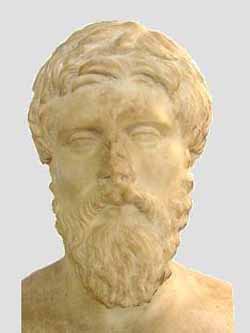Plutarch
Plutarch was a Greek, born in Chaeronea, who became a Roman citizen; however, although he was the firend of the Emperor, he rarely left his home town, where he was Archon (ruler) and priest of the oracle of Delphi.
He was a briliant author, interesting and insightful. He was a pioneer of the approach which sees history as the edifying stories of great lives (which we should copy). He wrote his Life of Alexander as one of a series of 'Parallel Lives', comparing ancient Greeks with 'modern' Romans (Alexander was compared to Julius Caesar). He openly admitted that he preferred illuminating 'stories' to the details of battles, dates etc., because it is in the anecdotes that we see the real character and personality of the individual.
Although he lived four centuries after Alexander, Plutarch used many contemporary sources; but he was well aware that these sources were unreliable, and warns his reader of this by phrases such as 'it is said...'
Historians have criticised Plutarch for being biased towards the Greeks, and for distorting the historical record to make it fit his ideas of life as a battle between good and evil.
1. Strengths of Plutarch
* lived in the historically significant town of Chaeronea
* trained as a philosopher
* Archon of Chaeronea, Roman citizen, ambassador and maybe procurator
* priest of the oracle at Delphi
* experienced writer
* used a wide range of sources available
* aware that some of his sources were unreliable
* interesting because interested in his subects
* "a master of style, rhetoric and biographical technique"
2. Weaknesses of Plutarch
* he manipulated his material to fit his world-view of life as a battle between good and evil
* he manipulated his content material to force parallels between Alexander and Caesar
* he tweaked quotes to meet his need
* he focussed on character not events in order to make moral judgements
* he focussed on character not events and this sometimes obscures what was happening
* he can only be as reliable as his sources
* he was "fanatically biased in favour of the Greeks"
* he pioneered 'heroic' history, with its focus on the achievements of individuals
* ultimately his history is a (subjective) interpretation .

Links:
The following web pages will help you complete the task:
This document contains the relevant sections of the set
OCR Textbook.
Plutarch - Mr Clare's factsheet
Task
Read the following passages from Plutarch, and write answers to the questions which follow:
It is the life of Alexander the king … that I am writing in this book, and the multitude of the deeds to be treated is so great that I shall make no other preface than to entreat my readers, in case I do not tell of all his famous actions, nor even speak exhaustively at all in each particular case, but in example for the most part, not to complain.
For it is not Histories that I am writing, but Lives; and in the most illustrious deeds there is not always a manifestation of virtue or vice, nay, a slight thing like a phrase or a jest often makes a greater revelation of character than battles where thousands fall, or the greatest armaments, or sieges of cities.
Accordingly, just as painters get the likenesses in their portraits from the face and the expression of the eyes, wherein the character shows itself, but make very little account of the other parts of the body, so I must be permitted to devote myself rather to the signs of the soul in men, and by means of these to portray the life of each, leaving to others the description of their great contests.
Suggest TWO things this passage tells us about the way Plutarch wrote the Life of Alexander. [4]
Explain what this passage shows about why Plutarch wrote the Life of Alexander. [4]
The outward appearance of Alexander is best represented by the statues of him which Lysippus made, and it was by this artist alone that Alexander himself thought it fit that he should be modelled. For those peculiarities which many of his successors and friends afterwards tried to imitate, namely, the poise of the neck, which was bent slightly to the left, and the melting glance of his eyes, this artist has accurately observed…
Moreover, a very pleasant odour exhaled from his skin and that there was a fragrance about his mouth and all his flesh, so that his garments were filled with it, this we have read in the Memoirs of Aristoxenus. In your
opinion, how reliable is Plutarch’s account of Alexander?
Now, the cause of this, perhaps, was the temperament of his body, which was a very warm and fiery one; for fragrance is generated, as Theophrastus thinks, where moist humours are acted upon by heat. Wherefore the dry and parched regions of the world produce the most and best spices. And in Alexander's case, it was the heat of his body, as it would seem, which made him prone to drink, and choleric.
But while he was still a boy his self-restraint showed itself in the fact that, although he was impetuous and violent in other matters, the pleasures of the body had little hold upon him, and he indulged in them with great moderation, while his ambition kept his spirit serious and lofty in advance of his years.
You must refer
both to this passage, and to your knowledge of Plutarch as a writer. [5]